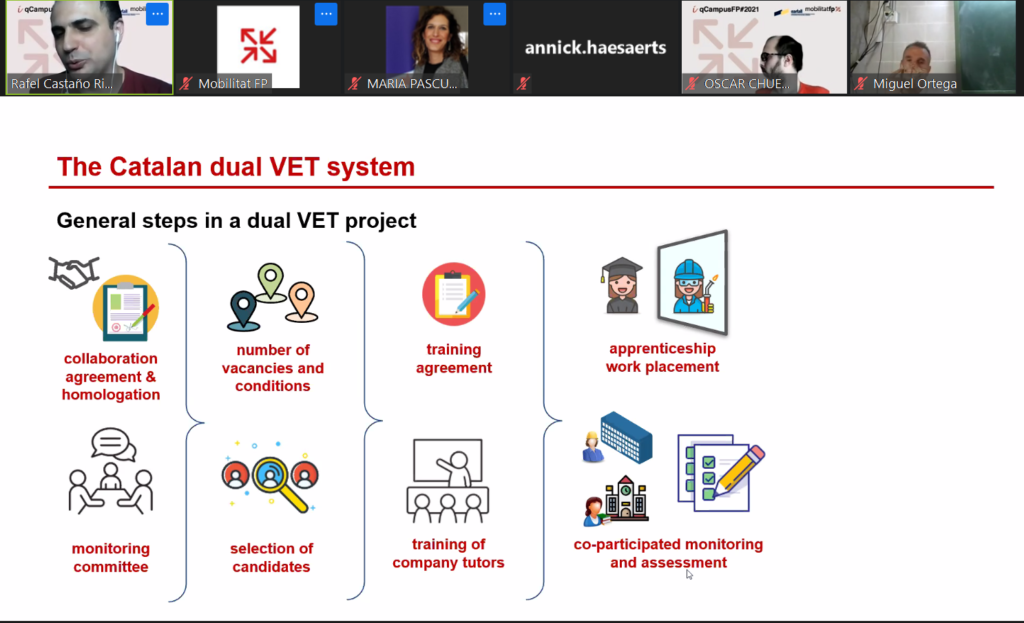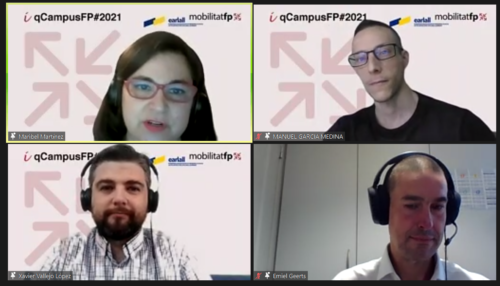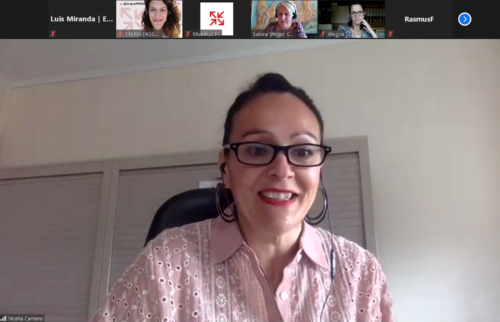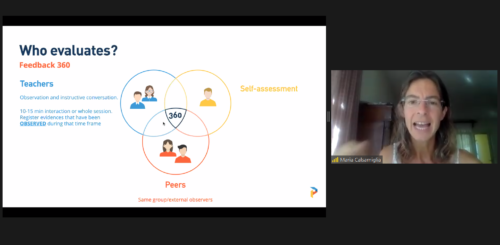iqCampusFP#2021: VET teachers and pedagogies at the heart of the discussion!
09/07/2021

From 2 to 7 July 2021, the Regional Ministry of Education of the Government of Catalonia organised the International VET Campus iqcAMPUSfp#2021, in cooperation with EARLALL and some of its Member Regions and Associate Members. The iqcAMPUSfp#2021 aimed at reinforcing teacher capacity building and networking to boost innovation in Vocational Education and Training (VET) systems. Four online workshops were organised, tackling different innovative aspects, gathering a total of more than 100 participants, mostly VET teachers, education experts and other stakeholders at regional, national and European level.
The first workshop took place on 2 July and focused on the CLIL (Content and Language Integrated Learning) methodology. It was organised in the context of the VET’s CLIL project, co-funded by the Erasmus+ programme of the European Union. During the workshop, the VET’s CLIL project results were introduced, and expert views on the topic were offered. Furthermore, CLIL teachers had the opportunity to explain the CLIL methodology and to share their experiences with participants.
The second workshop, organised on 5 July 2021, aimed at rethinking the learning and teaching process in VET. Maria Calsamiglia, Co-Founder of Pentabilities, presented this novel method which offers tools and a methodology to develop socioemotional skills through formative assessment and visualize their progress. Then, Gabriela Rodriguez, Pedagogical Manager at the Istituto Pavoniano Artigianelli in Trento presented a shared planning project which aims at making the transformation of the physical learning space more significant on a scientific level, with the will of giving a wider visibility to the path of didactic and methodological innovation. She was followed by Bart Verswijvel, Senior Pedagogical Adviser at the European Schoolnet, who presented the Future Classroom Lab initiative, a fully equipped, reconfigurable teaching and learning environment in Brussels, challenging visitors to rethink the role of pedagogy, technology and design in their classrooms.
Then, the workshops hosted on 6 and 7 July 2021 focused on international VET dual systems. A dual VET system is a collaboration between a company or an organisation and a VET school. Students combine school-based training and work-based learning (WBL) during their academic career. The first workshop included a presentation of the German VET dual system, presented by Christiane Spies, from the Centre for School Quality and Teacher Training, Baden-Württemberg Ministry of Culture, Education and Sport. A key challenge identified in Baden-Württemberg is the need to improve the attractiveness of the VET dual system.
She was followed by Jens Vermeersch, Internationalisation Manager at GO!, and Annick Haesaerts, Policy Coordinator for VET at GO!, who presented the Flemish dual system, aimed at solving three challenges: improving the link between education and the labour market, reducing the drop-out of unqualified learners and reducing youth unemployment. Then, Rafa Castaño, from the Catalan Regional Ministry of Education, presented the Catalan dual system and highlighted that it allows the student to develop their skills in a real work environment and acquire a longer and recognized work experience.
 |
 |
 |
The second workshop introduced three additional dual VET systems and was moderated by Noelia Cantero, EARLALL Director. The French experience was presented by Sabine Weger, Project Manager and Policy Advisor at French network of chambers of skilled crafts and trades. A reform of the VET system was introduced in France in 2018 and, since then, the number of apprentices continued to increase up to 491,000 in January 2020. She was followed by Rasmus Flick, Project Developer at the West Sweden Chamber of Commerce (WSCC), who introduced the Swedish case. He remarked that even if apprenticeships are not a tradition in Sweden as they were introduced only in 2008-2011, the dual system is developing. After that, the Swiss dual system was presented by Yvonne Jänchen, Programme coordinator in the VET sector at Movetia. One of the strengths of the Swiss VET system is the high level of labour market demand, together with low unemployment rates. The workshop ended with a roundtable where all the speakers discussed how international dual mobility can be facilitated both from an administrative and a pedagogical perspective.
After the success of these four intense days of learning and exchanging and seeing the number of topics raised during the discussions, the organisers are already thinking of the next iqCampusFP#2022 edition.
Useful links
Presentations
Day 1: The CLIL approach
- Maria Pascual, Education Department, Government of Catalonia
- Christina Reissner, Universität des Saarlandes
- Marta Valero Compte, Santa Eugenia VET centre
- Sussan Dreger, Catalonia
- Antònia Cladera, Catalonia
Day 2: The distribution of the classroom setting
Day 3: International Dual VET System (part 1)
- Christiane Spies, Baden-Württemberg
- Jens Vermeersch, GO! Education of the Flemish Community
- Annick Haesaerts, GO! Education of the Flemish Community
- Rafa Castaño, Catalonia
Day 4: International Dual VET System (part 2)
- Sabine Weger, French network of chambers of skilled crafts and trades
- Rasmus Flick, West Sweden
- Yvonne Jänchen, Movetia, Switzerland

